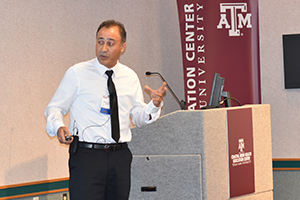Conference teaches safe, effective pain management
February 10, 2018

The opioid crisis in America has taken root in communities across the state of Texas. In 2016, more than 2,800 people died of drug overdoses in Texas, which is a 7.4 percent increase from the previous year, according to the Centers for Disease Control and Prevention. In 2017, 18 million prescriptions for opioids were dispensed in Texas. Opioid misuse and overdose impacts almost every family and community in some way.
To address this pervasive problem, the Texas A&M Coastal Bend Health Education Center hosted the Opioid and Pain Management Conference early February.
“The goal of this conference is to educate health care professionals on the importance of safe pain management practices,” said Wilson Velasquez, MD, a practicing anesthesiologist and the course director of the conference. “We will present alternatives to help patients have less pain in a healthier way.”
Sessions updated health care professionals on the history of pain management prescribing, pharmacology and toxicology of opioids, Texas drug prescribing laws and regulatory bodies, a pain management physician’s practice experience, the many faces of reward deficiency syndrome, opioid conversion calculations and new drug updates.
More than 115 health care professionals, ranging from physicians to pharmacists, registered for the conference.
“We congratulate the Texas A&M Coastal Bend Health Education Center for their foresight to organize this timely conference and engage diverse clinical and community stakeholders,” said Marcia Ory, PhD, MPH and regents and distinguished professor at the Texas A&M University Health Science Center. “This event underscores the important role that everyone plays to address the current opioid crisis affecting Texans of all ages.”
Before the conference, the Texas A&M University Health Science Center hosted a brainstorming session for medical professionals to generate feedback on how the opioid epidemic affects older adults. This “think tank” brought together professionals from a number of disciplines to address the problem from multiple perspectives
“We aim to identify practical and effective solutions to assist the older adult who is addicted, reduce disruptions in caregiving responsibilities due to family member’s addiction, and minimize the diversion of limited health care resources needed to adequately address other chronic diseases and disabilities,” said Ory, who chaired the session.
Session participants included primary care providers, dentists, oncologists, pharmacists, substance abuse recovery specialists and others on the frontlines of the opioid crisis. The group plans to prepare a consensus statement to be presented to state legislators in the near future.
-Lindsey Hendrix and Les Cockrell
